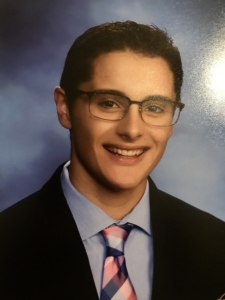Overcoming ED, My Biggest Bully
For all of my childhood, I was considered “overweight.” Whether it was my food choices or just genetics I’m not sure, but I was okay with it. I was a happy kid and I enjoyed life and everything it had to offer. As I started to get older, people like family friends, coaches, and peers would say things to me or my parents about my weight.
Content note: descriptions of eating disordered behaviors and suicidal ideation
I tried not to let it bother me, but things kept getting worse. It went from comments every once in a while to outright bullying from my peers. I would get called names and I would be the target of jokes because of my body. My self-confidence dropped and I did not understand why people didn’t like me just for the way I looked.
I went through this experience with someone who became very close to me; he too struggled with his weight and faced the same bullies that I did. We supported each other and tried to stand up for one another until he took his own life. He was the only person who knew what I was going through and knew how I felt; I was lost without him.
Similar to my friend, I was depressed and suicidal, and this was when I met ED. ED told me that he could help me lose weight and start to feel more confident about myself. I finally got away from my bullies, but the damage was done: I was depressed and scared, I was suicidal, and I was too embarrassed to tell anyone.
ED told me that he could help me turn my life around by helping me lose weight. If my body fit societal ideals, nobody would make fun of me anymore. I had been so hurt by all of those people that I dove in head first and listened to everything that ED told me to do. When I saw results and people started to tell me about how awesome I was doing, I started to feel happier.
At times, I felt like I was just a normal kid and my depression and suicidal thoughts would subside. This all changed as I hit plateau of weight loss. I became frustrated. I did not realize it at the time, but looking back on it now, ED conditioned me to only be happy with myself when I was losing weight. This meant that no matter how much weight I had lost, it wasn’t good enough. I quickly fell back into a depressed and suicidal state, because the one thing that made me happy was gone again.
After months of this, I admitted to myself that there was really something wrong, I had lost a significant amount of weight in less than a year, none of my clothes fit, I had no energy, I was tired all the time, and I just wanted to lie in bed all day. I finally reached out to my mom and we met with a therapist and a dietician. They told me all about ED; I thought he was just my own thoughts, but he is something completely different.
ED is not a person or a name, ED is actually my eating disorder. He is manipulative, abusive, sneaky, and he just wants to see me burn. But I was attached to him because he made me feel comfortable and he made me feel like I had control.
In therapy, I learned how to beat ED, and along with the support of my friends and family, I learned how to do what was healthy for me by telling ED that I was done putting up with his abuse and manipulation. I also learned how to love myself and appreciate the good things that I do.
Although ED will remain with me for the rest of my life, his words mean less and less to me each day. No two eating disorders are the same, but they all have one thing in common: they can be beaten.
For recovery resources and treatment options, please visit our help and support page. If you or someone you know is struggling with an eating disorder, call ANAD’s Helpline at: (888) 375-7767 or the National Alliance of Eating Disorders Helpline at: (866) 662-1235.
If you are thinking about suicide, call or text the National Suicide Prevention Lifeline at 988. In crisis situations, text “NEDA” to 741741 to be connected with a trained volunteer from the Crisis Text Line.
Grant Theisen is from Downers Grove, a town just outside of Chicago, Illinois. He is currently a senior in high school and in the fall he plans to go to college and study economics. Grant has struggled with an eating disorder throughout high school and hopes to help others by sharing his story.





